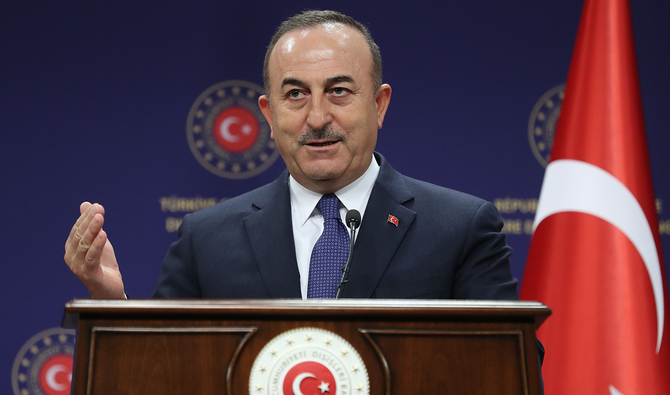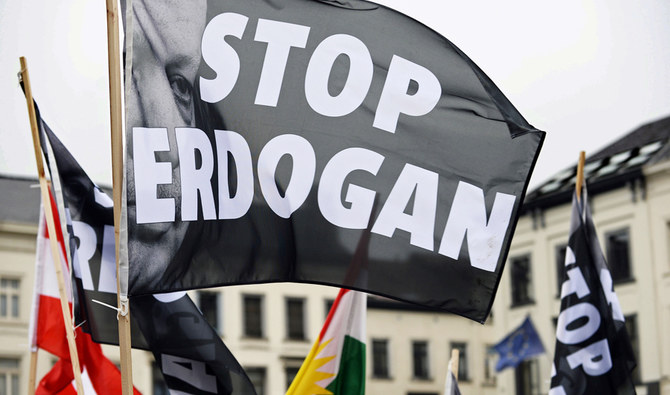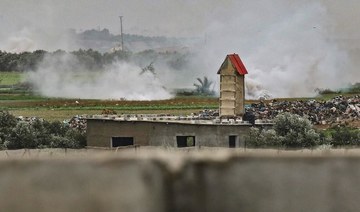ANKARA: Amid speculations about a possible Turkish-Israeli rapprochement in the foreseeable future, Israel refuses to normalize relations with Turkey or return its envoy to Ankara until the activities of Hamas’ military wing in Istanbul end, Israeli news site Ynet reported on Monday.
This prerequisite prompted Ankara to bring forward its own conditions to reconcile with Israel. Turkish Foreign Minister Mevlut Cavusoglu told reporters in Ankara on Monday that relations would be normalized if Israel were to halt “its illegal actions, such as annexations against Palestine.”
Ankara’s support for Hamas as well as its prioritization of Israel’s Palestine policies pose further challenges to already fragile relations with Israel. Hundreds of Hamas operatives allegedly live in Turkey.
If both countries are sincere about restoring diplomatic ties, it is still unknown to what extent they are willing to give concessions on these red lines and at what cost.
In 2018, Turkey recalled its ambassador from Israel to protest against the US moving its embassy to Jerusalem, while the move was reciprocated by Israel who also recalled its own envoy in Ankara.
In early 2020, Turkish President Recep Tayyip Erdogan hosted in Istanbul Ismail Haniyeh, political chief of Hamas, and Saleh Al-Arouri, the group’s top military commander, who has a $5 million US bounty on his head, prompting objections from Israel and Washington.
While Turkey considers Hamas a legitimate political movement that is elected democratically in Gaza, Hamas is seen as a terror organization by the US, EU and Israel.
In October 2020, The Times claimed that the military branch of Hamas had set up a secret office in Istanbul to remotely plot cyberattacks against its foes and that Turkey even granted Turkish citizenship and passports to dozens of high-ranking Hamas members to facilitate their travel in Europe. However, Ankara denied the claims.
Turkey categorically denies providing sanctuary to a Hamas office in Istanbul.
Since 2015, Israel has been asking Ankara to crack down on Hamas operatives who are settled there. It was also known as one of the preconditions for Turkey’s entry into the Western coalition against Daesh.
Selin Nasi, a researcher on Turkey-Israel relations from Bogazici University in Istanbul, recalls that Ankara had expelled Al-Arouri prior to the reconciliation deal of 2016 and pledged to limit the activities of Hamas offices in Turkey.
“If Ankara agrees to downplay its support for Hamas, this might pave the way for a thaw in Turkish-Israeli relations. For Israelis, Turkey providing shelter to Hamas members in the country has been a major bone of contention. Because they see Hamas as a terror organization, so this is a national security matter,” she told Arab News.
A letter penned by Haniyeh late in December and sent to several presidents of Islamic countries, including Erdogan, recently made headlines in Turkey, as he warned the Turkish president against any overture to Israel, saying that any steps toward normalization would benefit “Zionism.”
Alan Makovsky, a senior fellow at the Washington-based Center for American Progress, thinks Erdogan’s motivation is mainly ideological due to the well-known affinity with Muslim Brotherhood-affiliated movements, but perhaps also partly political.
“Turkey formally supports two states, whereas Hamas rejects Israel’s existence. Based on formal policy, Turkey should be much more supportive of Palestinian President Mahmoud Abbas than Hamas, and that’s manifestly not the case,” he told Arab News.
Makovsky thinks that supporting Hamas is not a vote-getter in the traditional sense because Hamas has been rated very negatively by the Turkish public.
According to Pew Research Center’s most recent survey from 2014, Turks hold a negative view of Hamas, with 80 percent disapproving of it and only 8 percent approving the group.
“The one political benefit Erdogan derives from supporting Hamas — and it’s not insignificant — is that it helps to keep the Islamist portion of his ruling Justice and Development Party firmly bonded to the party itself, rather than drifting over to the Islamist rival Felicity Party,” Makovsky said.
According to Makovsky, it would be unthinkable for the Israelis to re-exchange ambassadors when they are convinced that Hamas is conducting operational planning from Turkey.
“I doubt Israel is eager to exchange ambassadors with Turkey in any case. From Israel’s point of view, it would simply be an unearned gift that would help facilitate Erdogan’s relations with US President Joe Biden,” he said.
He added: “Were Turkey to expel Hamas and pledge to cease receiving visits from the likes of Hamas former leader Khaled Meshaal and senior Hamas figure Al-Arouri, Israel would resume ambassadorial-level relations in a nano-second.”
Researcher Nasi thinks that Ankara is equally concerned about the domestic implications of revamping support for the Muslim Brotherhood, at a time when the Palestinian issue is at an impasse and, even worse, it is no longer on the international agenda.
“From a strategic perspective, the cost of Turkey’s pro-Muslim Brotherhood policy seems to have exceeded its benefits, undermining Turkey’s relations with Egypt and the Gulf countries, resulting in regional isolation,” she said. “Ankara has reached a critical point where it needs to decide whether or not to prioritize geopolitical interests over ideology.”
According to Nasi, recent statements by the Turkish foreign minister suggest that the government is trying to find a diplomatic opening by reframing the conflict around the Palestinian issue and shifting the emphasis to Israel’s partial annexation of the West Bank.
“Indeed, the signing of the Abraham Accords last summer practically shelved Israel’s plans to annex parts of the West Bank. Therefore, the pre-condition that Cavusoglu mentioned on Monday has been already fulfilled,” she said.
For Nasi, at the end of the day, it comes down to whether Turkey is willing to take a step toward strategic reorientation.















